The article underscores the critical web solutions that drive the success of hospitality businesses by elevating their digital presence and refining revenue management strategies. It emphasizes the significance of:
These elements collectively enhance brand visibility, foster customer engagement, and ultimately boost occupancy rates and profitability in a fiercely competitive market.
The hospitality industry is currently experiencing a digital transformation, with establishments increasingly depending on innovative web solutions to boost their visibility and profitability. This article delves into ten essential web strategies that empower hotels and restaurants to optimize their marketing efforts, streamline revenue management, and ultimately enhance guest engagement. However, as competition intensifies, the pressing question arises: how can these businesses effectively leverage technology to not only survive but thrive in this evolving landscape?
Lights On offers a comprehensive suite of digital promotion and income management services tailored specifically for the hospitality industry. Their offerings encompass:
By leveraging data-driven insights, Lights On empowers hotels and restaurants to refine their marketing strategies and optimize profit streams. This holistic approach not only elevates but also significantly boosts occupancy rates and fosters overall financial growth.
As a strategic partner, Lights On equips hospitality businesses with essential tools to thrive amidst an increasingly competitive landscape, ensuring agility and responsiveness to market demands. Efficient income management is crucial, directly influencing key financial metrics such as:
Looking ahead to 2025, effective revenue management strategies will focus on:
These strategies will enable establishments to swiftly adapt to fluctuating market conditions and enhance profitability.
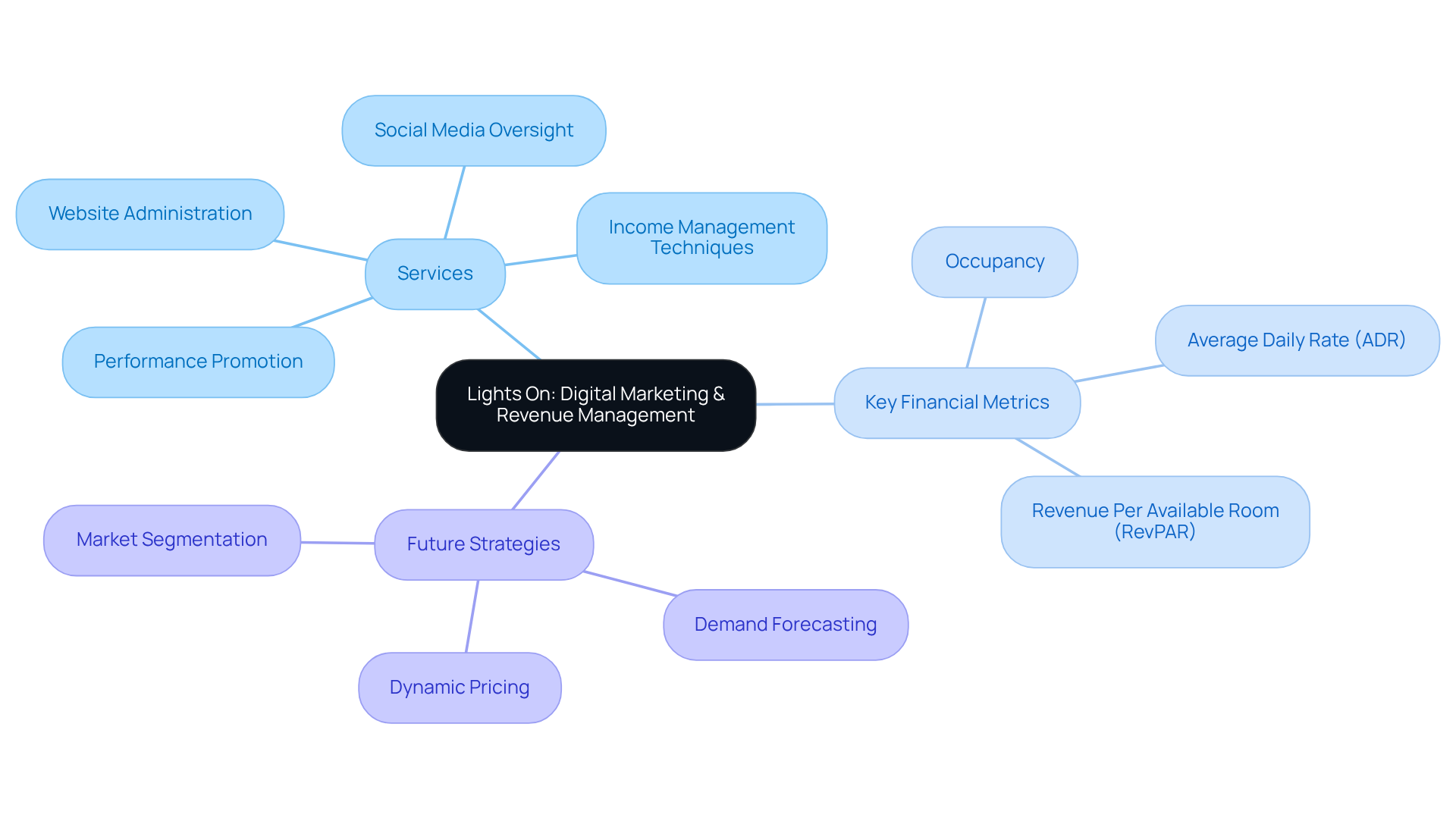
Independent web solutions empower establishments to create a unique online identity that significantly enhances visibility. In 2025, the importance of website design cannot be overstated; it plays a crucial role in ensuring potential guests can easily discover and engage with hotels. By focusing on optimized design elements—such as responsive layouts, intuitive navigation, and compelling content—hotels can markedly elevate their online presence and boost direct bookings.
Successful case studies illustrate this impact. For instance, Amritara Hotels and Resorts in India achieved a remarkable 40% growth in earnings after implementing strategic website enhancements with the guidance of Lights On. Furthermore, Olive Living experienced a 2X increase in income, demonstrating how can lead to substantial financial advantages.
Current trends in independent web solutions emphasize the necessity of a user-centric approach. Features like mobile optimization and fast loading times are essential, as they cater to the growing number of travelers who prioritize seamless online experiences. By investing in optimized website design, establishments not only enhance their visibility but also position themselves competitively in a crowded market, ultimately driving higher occupancy rates and revenue.

Logo Web Solutions excels in delivering impactful web solutions for digital promotion services tailored specifically for the hospitality sector. At the heart of their offerings lies the creation of a compelling brand identity, essential for establishing a memorable online presence. Effective logo design serves as the foundation of this identity, ensuring establishments are easily recognizable and resonate with potential visitors. Furthermore, cohesive branding across all digital platforms—from websites to social media—reinforces this identity, fostering trust and familiarity among travelers.
Targeted marketing campaigns amplify brand recognition, strategically positioning accommodations to stand out in a crowded marketplace. This comprehensive approach not only enhances visibility but also boosts bookings and revenue, making it vital for accommodations seeking web solutions to thrive in 2025 and beyond. Insights from branding specialists underscore that a well-crafted logo and consistent branding can significantly impact visitor attraction, ultimately leading to higher occupancy rates and customer loyalty. Notably, 75% of consumers indicate that social media influences their travel choices, highlighting the necessity for accommodations to maintain a strong online presence.
Moreover, effective accommodation promotion tactics, such as leveraging user-generated content (UGC), play a critical role in contemporary branding strategies. UGC fosters trust and serves as social validation, showcasing that can attract potential visitors. By implementing these strategies, hospitality businesses can not only enhance their brand image but also drive customer engagement and loyalty.
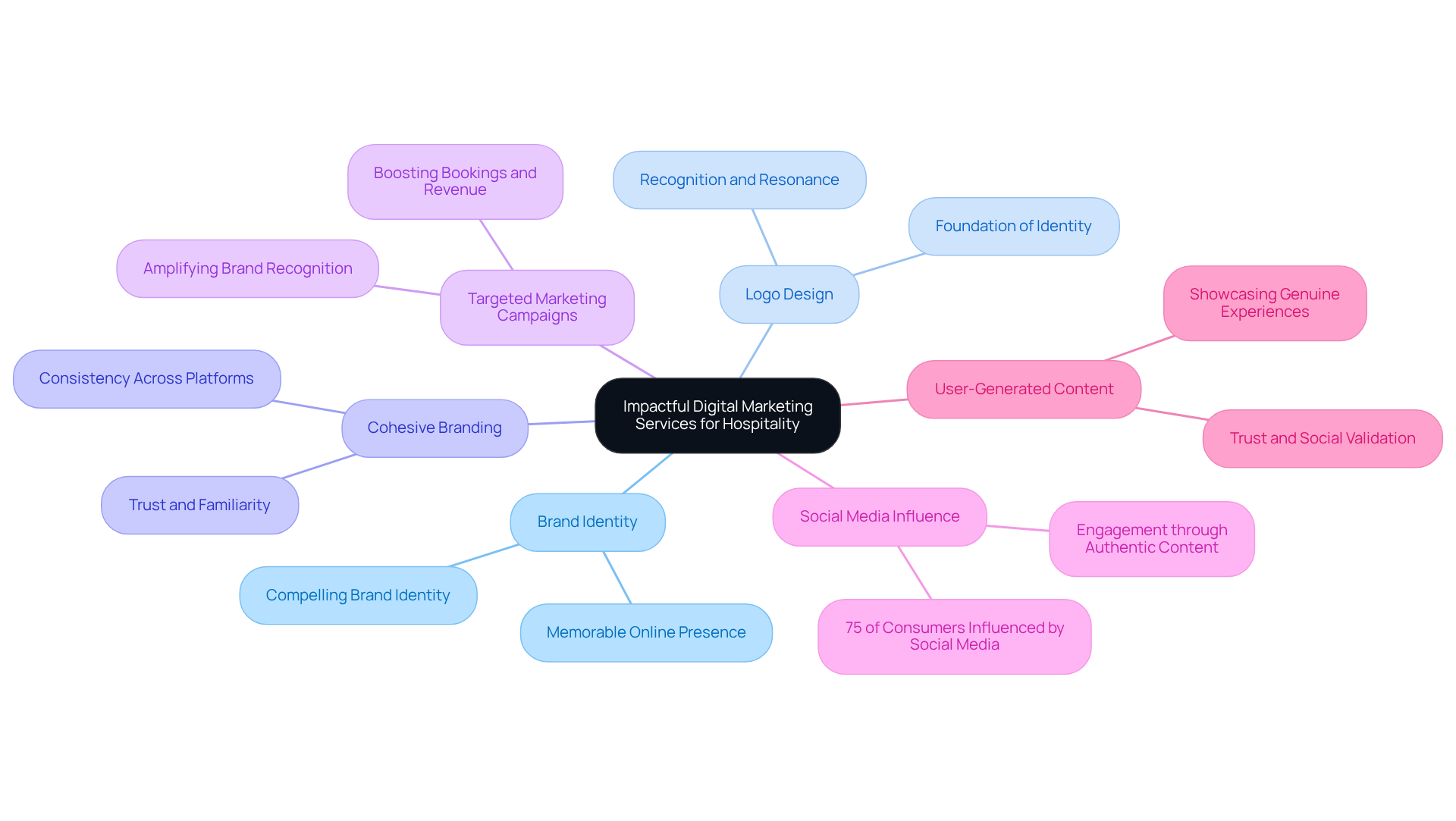
Performance promotion is crucial for optimizing advertising expenditure in the hospitality sector, emphasizing the need for measurable results. By leveraging data analysis and monitoring key performance indicators (KPIs), establishments can pinpoint which promotional channels yield the highest return on investment (ROI). This allows for real-time adjustments to campaigns, ensuring that advertising budgets are allocated effectively to maximize bookings.
In fact, businesses that utilize advanced analytics report a 5-8% higher return on investment compared to their competitors. As we approach 2025, the integration of AI-powered analytical tools is expected to further enhance these strategies, enabling establishments to automate the identification of high-value clients and tailor their promotional efforts accordingly.
By prioritizing performance marketing, accommodations can significantly improve their visibility and occupancy rates, adapting to the evolving landscape of digital marketing.
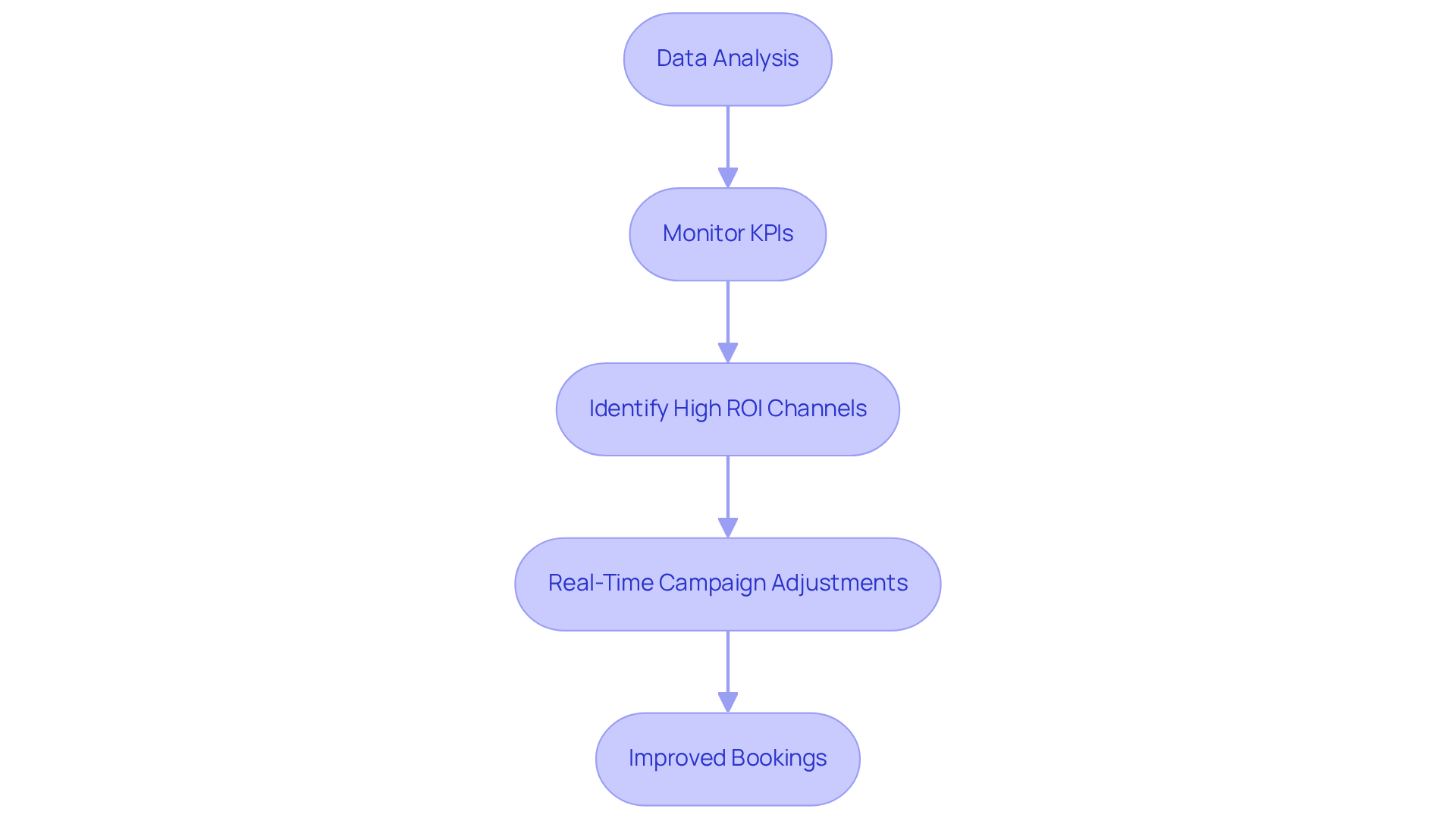
Effective social media management is essential for establishments seeking to engage customers and cultivate brand loyalty. By producing compelling content and promptly addressing visitor inquiries, these establishments can develop a vibrant online community. Social media platforms act as critical channels for connecting with potential guests, sharing promotions, and showcasing unique offerings. This proactive engagement not only enhances but also drives repeat bookings and encourages positive word-of-mouth referrals.
In fact, 82% of consumers utilize social media to discover brand awareness and customer engagement, highlighting its importance in the hospitality sector. As accommodations adapt to the evolving landscape, leveraging social media effectively will be vital for strengthening customer connections and securing lasting loyalty.
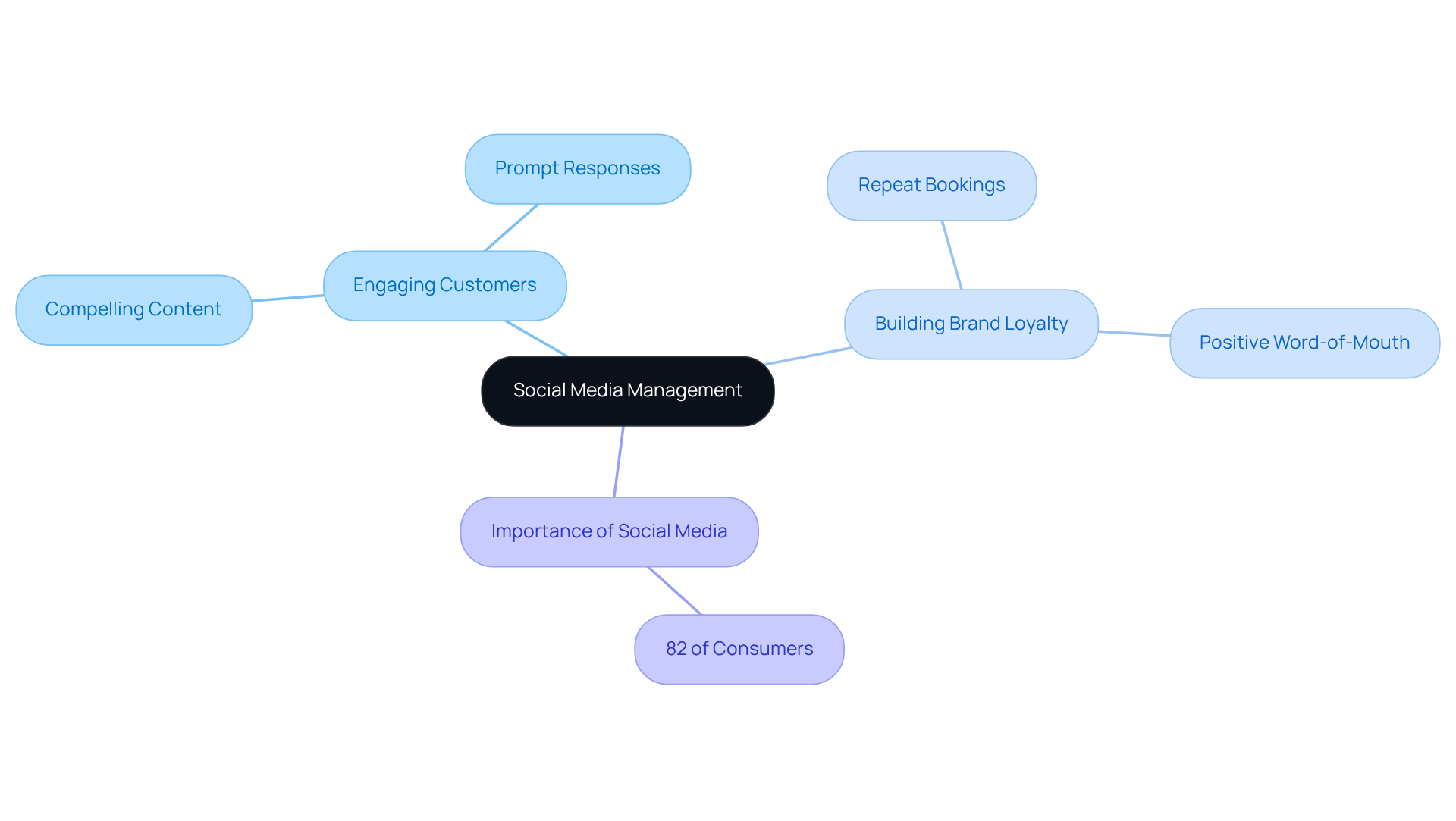
Search engine promotion (SEM) has emerged as a crucial strategy for accommodations seeking to boost their online presence and attract visitors. By utilizing paid search advertisements and enhancing website content, establishments can achieve prominent positions in search results, which is essential for appealing to potential guests actively searching for lodging. As we look toward 2025, the landscape of SEM is evolving, with a focus on personalized marketing and the use of customer data to tailor experiences. Successful hotels are now employing advanced SEM strategies that not only increase website traffic but also improve conversion rates, leading to a significant rise in bookings.
For instance, the Royal Orchid Hotel's targeted SEM campaign resulted in a remarkable 25% increase in direct bookings and an 8.5% click-through rate (CTR). Similarly, the Four Seasons Hotel achieved a 40% jump in CTR and a 20% revenue gain during a slower season by implementing a well-crafted PPC strategy. These examples underscore the effectiveness of SEM in driving tangible results.
Experts in digital marketing emphasize the necessity of being present when potential guests are searching for accommodations. As Anish Vijayan notes, businesses should focus on visibility rather than chasing customers. This approach is supported by statistics indicating that 46% of Google searches have local intent, highlighting the importance of local SEO strategies in SEM efforts.
Furthermore, efficient SEM tactics include creating captivating ad text that resonates with the intended audience, ensuring that accommodations distinguish themselves in a competitive market. Here are some actionable tips for hotel owners:
By continuously optimizing their online presence and utilizing data-driven insights, accommodations can enhance their visibility and foster lasting relationships with visitors through effective web solutions, ultimately driving growth and profitability.
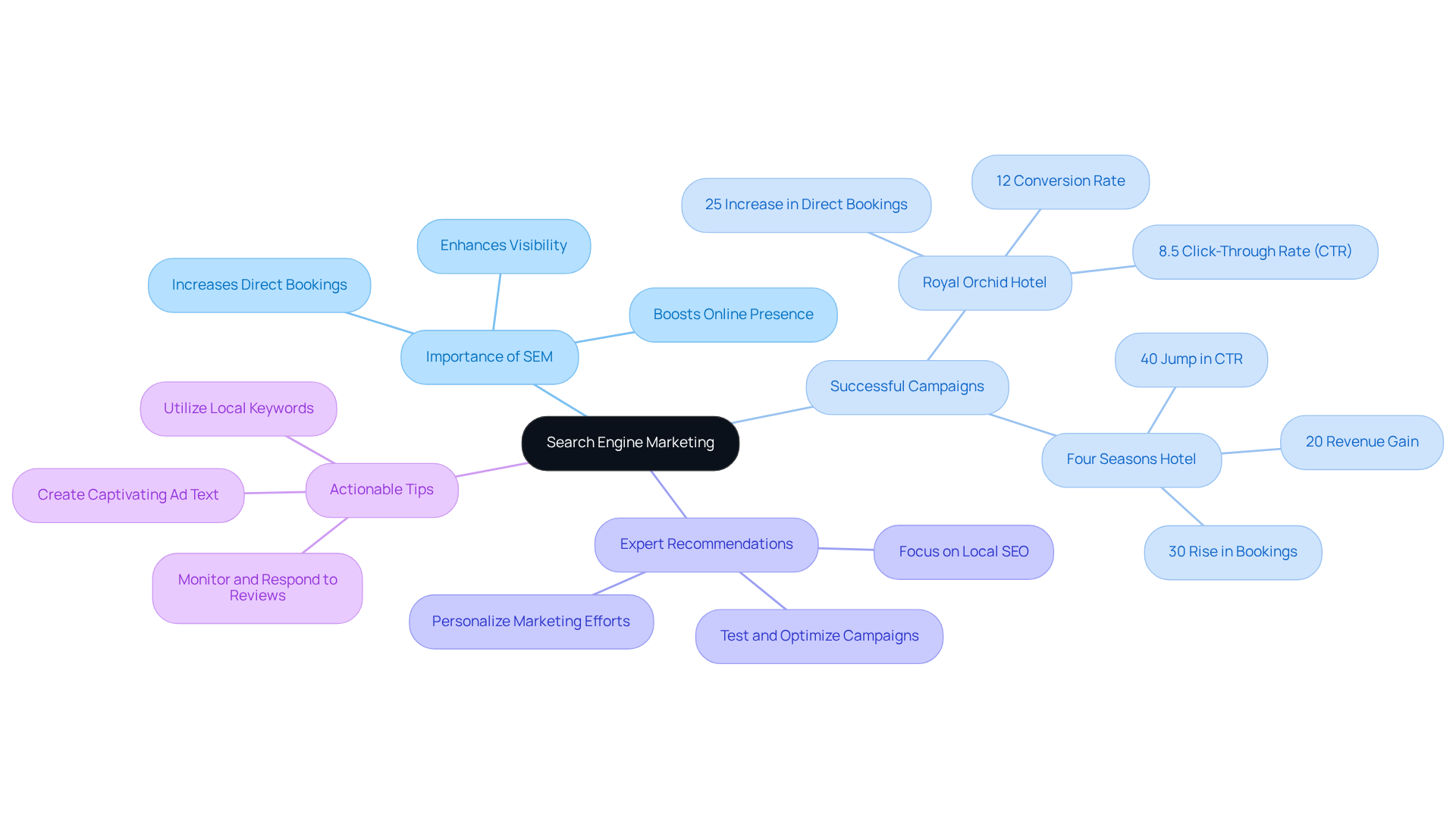
Website design stands as a pivotal element in and driving conversion rates for accommodations. A visually appealing and easy-to-navigate website, optimized for mobile devices, is essential. Fast loading times, clear calls-to-action, and intuitive booking processes are key components that contribute to a seamless user experience. By prioritizing website design, establishments significantly improve their potential to convert visitors into patrons, ultimately fostering financial growth.
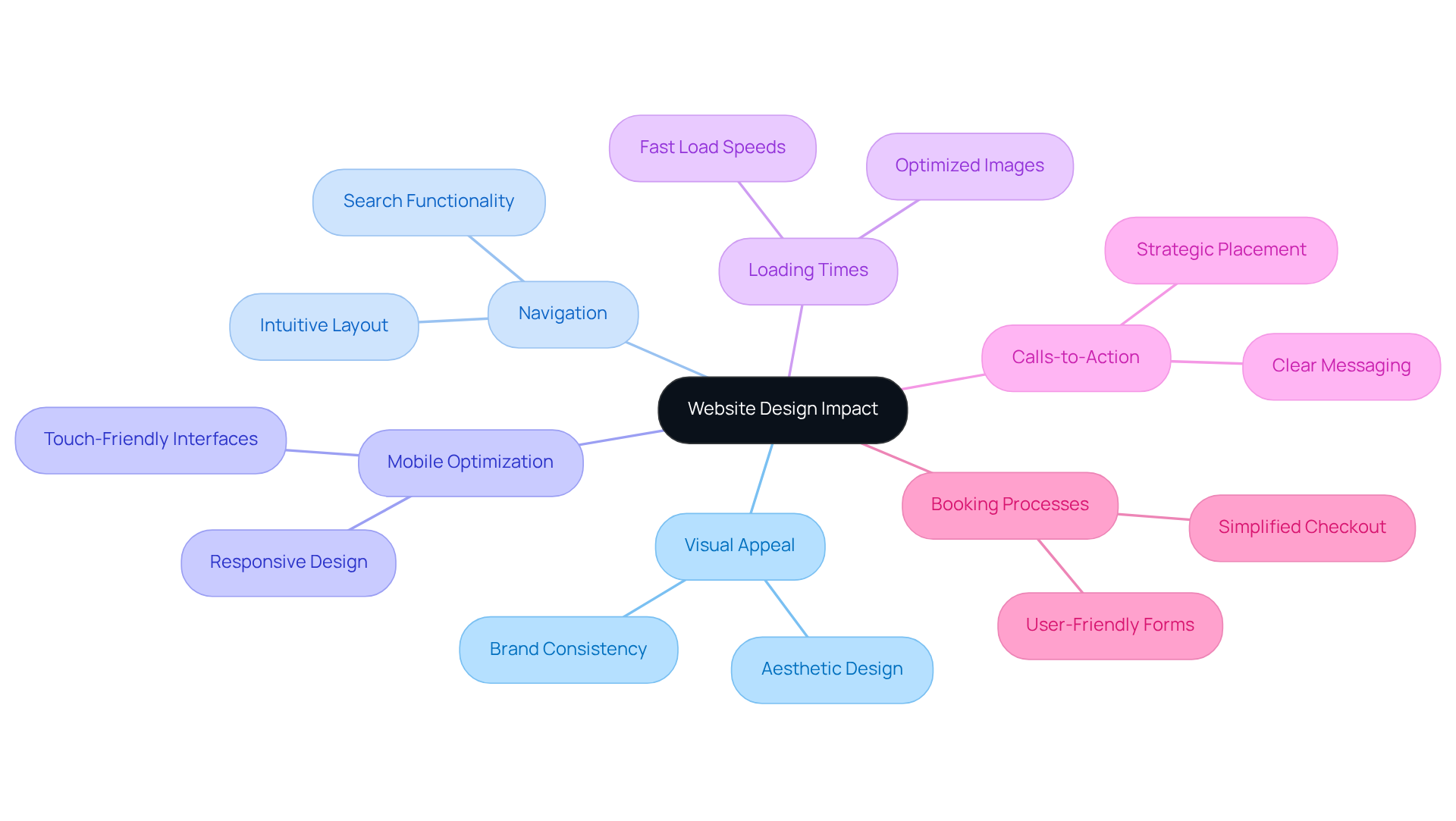
Pricing optimization stands as a vital strategy for accommodations aiming to maximize revenue and enhance profitability. By thoroughly examining market trends, competitor pricing, and visitor demand, accommodations can adopt dynamic pricing strategies that adjust rates based on real-time data.
For instance, utilizing tools like Revenue Management Systems (RMS) allows for automated pricing adjustments, ensuring that room rates remain competitive while capitalizing on peak demand periods. This approach not only elevates occupancy rates but also significantly enhances overall .
Furthermore, accommodations can strategically test promotional pricing during off-peak periods to attract more visitors, thereby maximizing income throughout the year. Effective pricing optimization not only boosts occupancy rates but also fosters enhanced customer satisfaction by offering personalized pricing options tailored to prevailing market conditions.
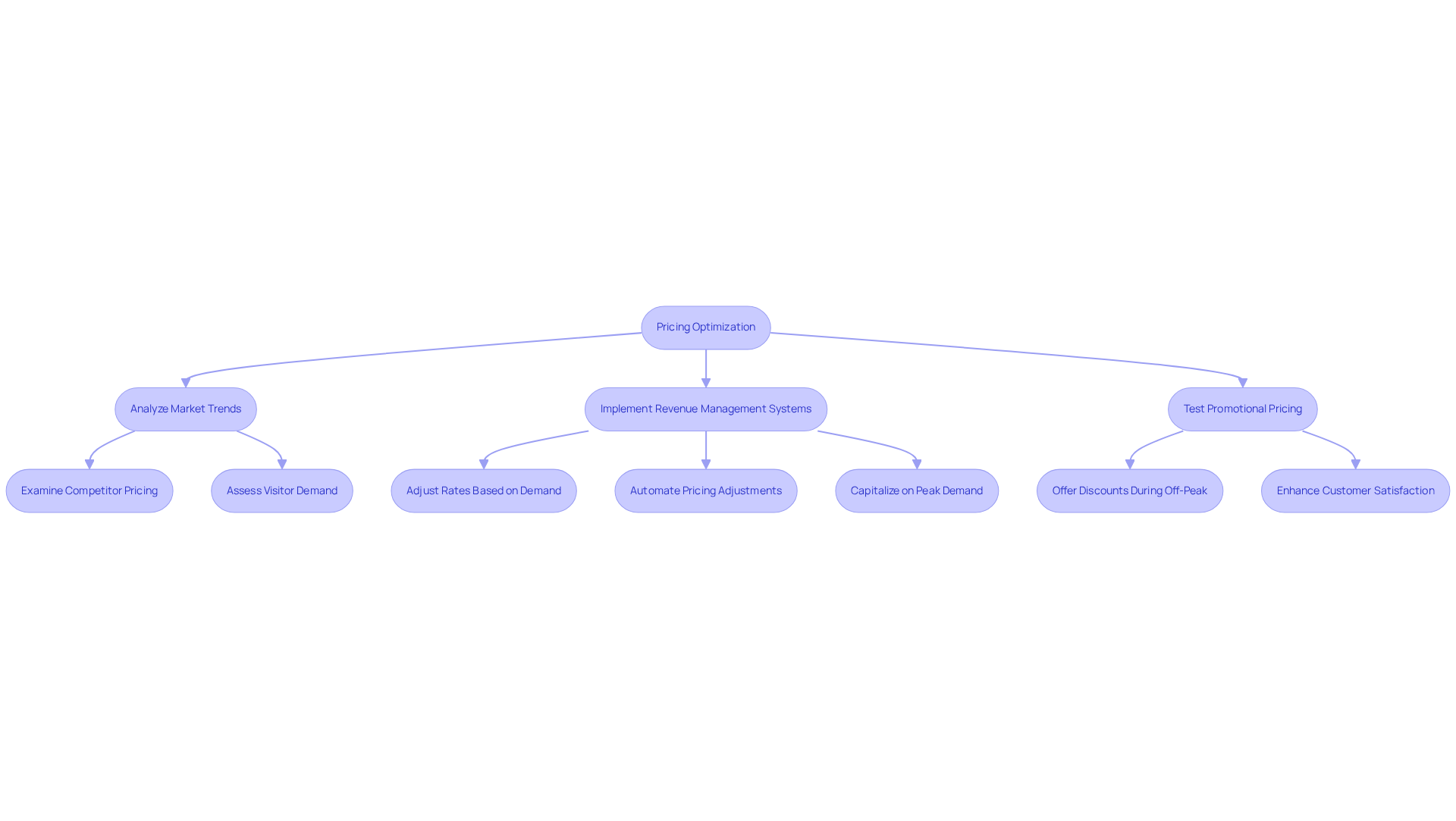
Demand generation is essential for attracting visitors and boosting occupancy rates for accommodations. By implementing targeted marketing campaigns, accommodations can effectively engage potential guests through diverse channels, such as social media and email marketing. For instance, leveraging platforms like Facebook, which boasts 2.9 billion monthly users, allows accommodations to connect with a vast audience and raise awareness about their offerings. Additionally, special promotions, unique packages, and unforgettable experiences significantly entice travelers to choose a specific accommodation over competitors.
Current trends indicate that approximately 35-40% of travelers utilize meta-search platforms for discovering accommodations, underscoring the necessity for establishments to actively engage in these channels to enhance visibility. Moreover, not only boost bookings but also elevate brand visibility in a competitive market, with 90% of travelers acknowledging that positive reviews influence their accommodation decisions. By focusing on these targeted marketing initiatives, accommodations can navigate the competitive landscape and achieve sustained occupancy growth.
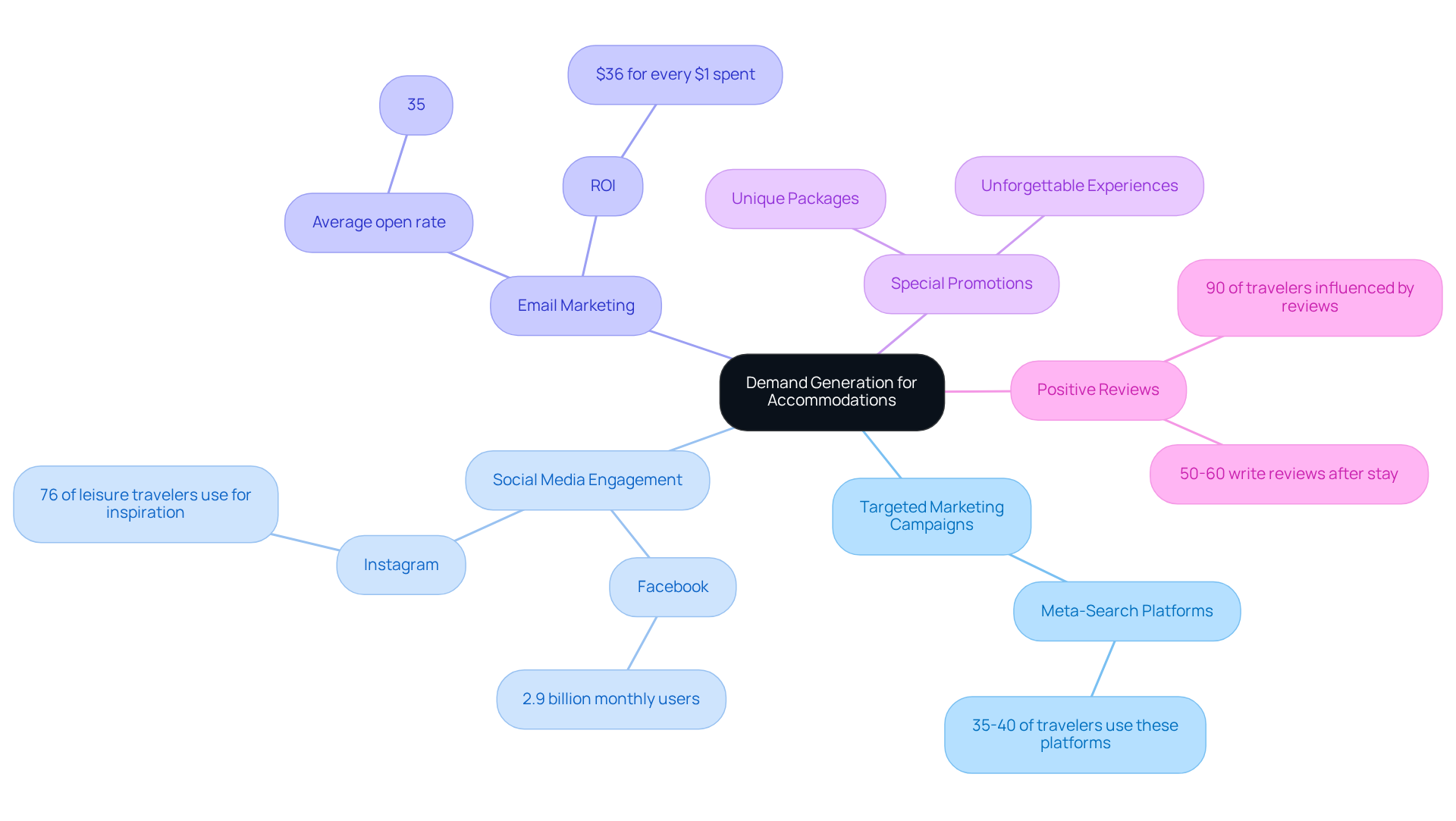
Market trend analysis is vital for accommodations seeking to inform strategic decisions and maintain a competitive edge. By scrutinizing data on consumer behavior, market dynamics, and industry trends, accommodations can uncover growth opportunities and identify areas for improvement. Notably, the hospitality sector is projected to expand to $4.9 trillion in 2024, with U.S. accommodation prices anticipated to rise by as much as 17.5% in select cities in 2025. This analytical approach empowers accommodations to tailor their , optimize pricing, and enhance guest experiences in alignment with prevailing market conditions.
To leverage these trends effectively, accommodations should:
Staying attuned to these trends enables hotels to make proactive decisions that drive success and profitability. As Dr. Valentina Clergue emphasizes, "The hospitality industry's commitment to leveraging market insights for strategic decisions is crucial for driving innovation and adapting to competitive threats.
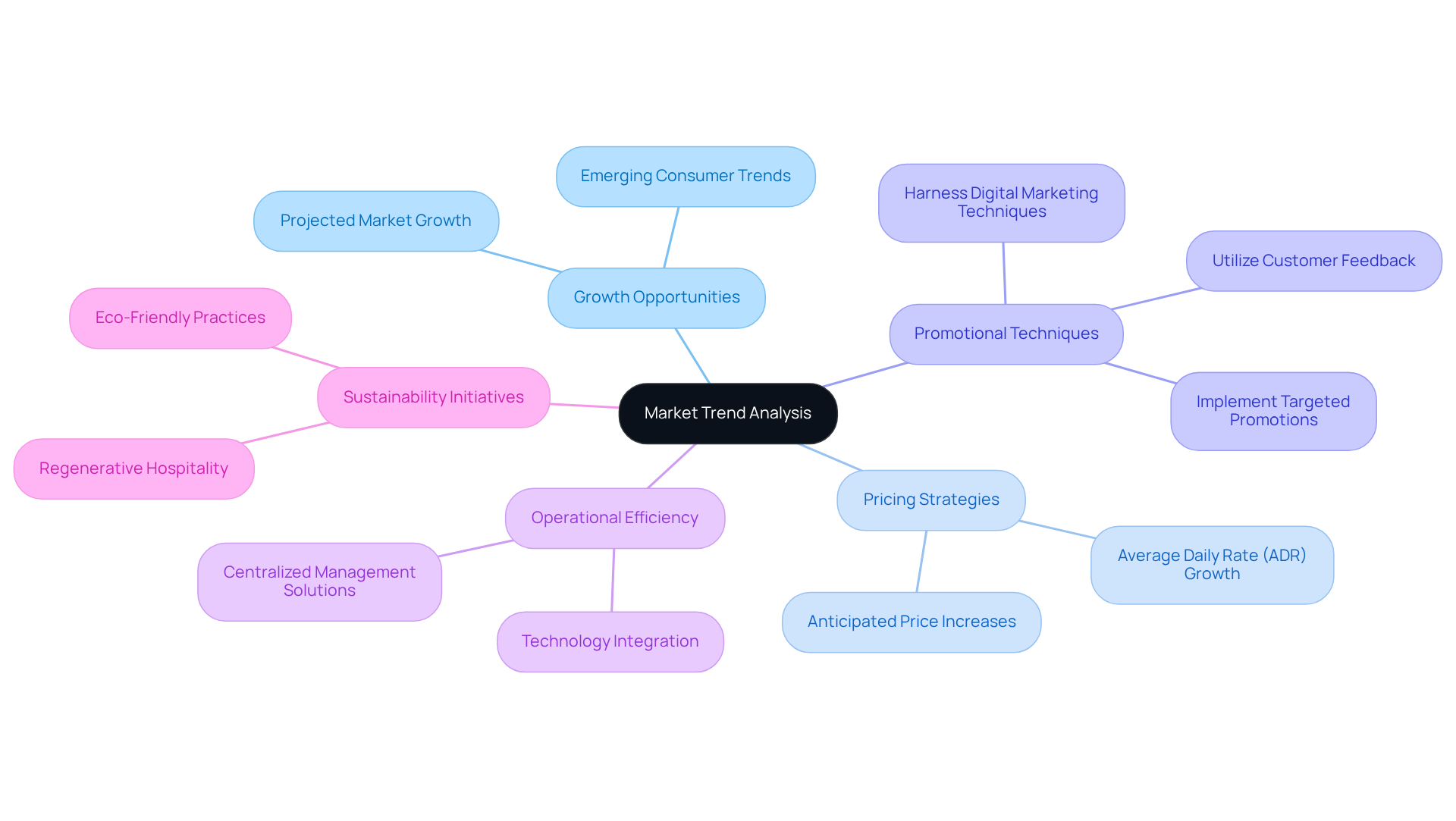
The hospitality industry is experiencing a profound transformation, propelled by the demand for effective web solutions that enhance visibility, optimize revenue, and foster customer engagement. Establishments that adopt comprehensive digital marketing strategies—from performance marketing to social media management—are strategically positioned to thrive in a competitive landscape. By leveraging advanced website design and pricing optimization tools, hospitality businesses can attract visitors and convert them into loyal customers.
Key insights underscore the necessity of tailored marketing approaches, effective data analytics, and a robust online presence. Strategies such as dynamic pricing, demand generation, and market trend analysis empower accommodations to make informed decisions aligned with evolving consumer behaviors and market conditions. Successful case studies illustrate the tangible benefits of investing in these essential web solutions, showcasing significant increases in occupancy rates and revenue.
Ultimately, the message is unequivocal: embracing innovative web solutions is vital for hospitality businesses targeting success in 2025 and beyond. By prioritizing digital strategies and remaining agile in response to market shifts, establishments can enhance brand visibility, improve customer experiences, and achieve sustained growth. The time to act is now—invest in these solutions to secure a competitive edge and nurture lasting relationships with guests.
What services does Lights On provide for the hospitality industry?
Lights On offers a comprehensive suite of digital promotion and income management services, including website administration, performance promotion, social media oversight, and advanced income management techniques.
How does Lights On help hotels and restaurants improve their marketing strategies?
Lights On leverages data-driven insights to empower hospitality businesses to refine their marketing strategies and optimize profit streams, elevating brand visibility and boosting occupancy rates.
What are key financial metrics influenced by effective income management?
Key financial metrics influenced by effective income management include occupancy, average daily rate (ADR), and income per available room (RevPAR).
What revenue management strategies are expected to be important in 2025?
Effective revenue management strategies for 2025 will focus on dynamic pricing, demand forecasting, and market segmentation.
What benefits do independent web solutions provide for hospitality establishments?
Independent web solutions empower establishments to create a unique online identity, significantly enhancing visibility and ensuring potential guests can easily discover and engage with hotels.
How can optimized website design impact hotel revenue?
Optimized website design, featuring responsive layouts, intuitive navigation, and compelling content, can elevate online presence and boost direct bookings, leading to substantial financial advantages.
Can you provide examples of successful website enhancements in the hospitality industry?
Yes, Amritara Hotels and Resorts in India achieved a 40% growth in earnings after implementing strategic website enhancements with Lights On, and Olive Living experienced a 2X increase in income.
What current trends emphasize the importance of user-centric web solutions?
Current trends emphasize mobile optimization and fast loading times, catering to travelers who prioritize seamless online experiences.
What role does logo design play in digital marketing for hospitality?
Effective logo design is essential for establishing a memorable online presence and ensures establishments are easily recognizable, which fosters trust and familiarity among potential visitors.
How does social media influence travel choices according to consumer insights?
Notably, 75% of consumers indicate that social media influences their travel choices, highlighting the necessity for accommodations to maintain a strong online presence.
What is the significance of user-generated content (UGC) in branding strategies for hospitality?
User-generated content fosters trust and serves as social validation, showcasing genuine guest experiences that can attract potential visitors and enhance brand image.
Transform your group booking strategies with Lights On and watch your occupancy soar.